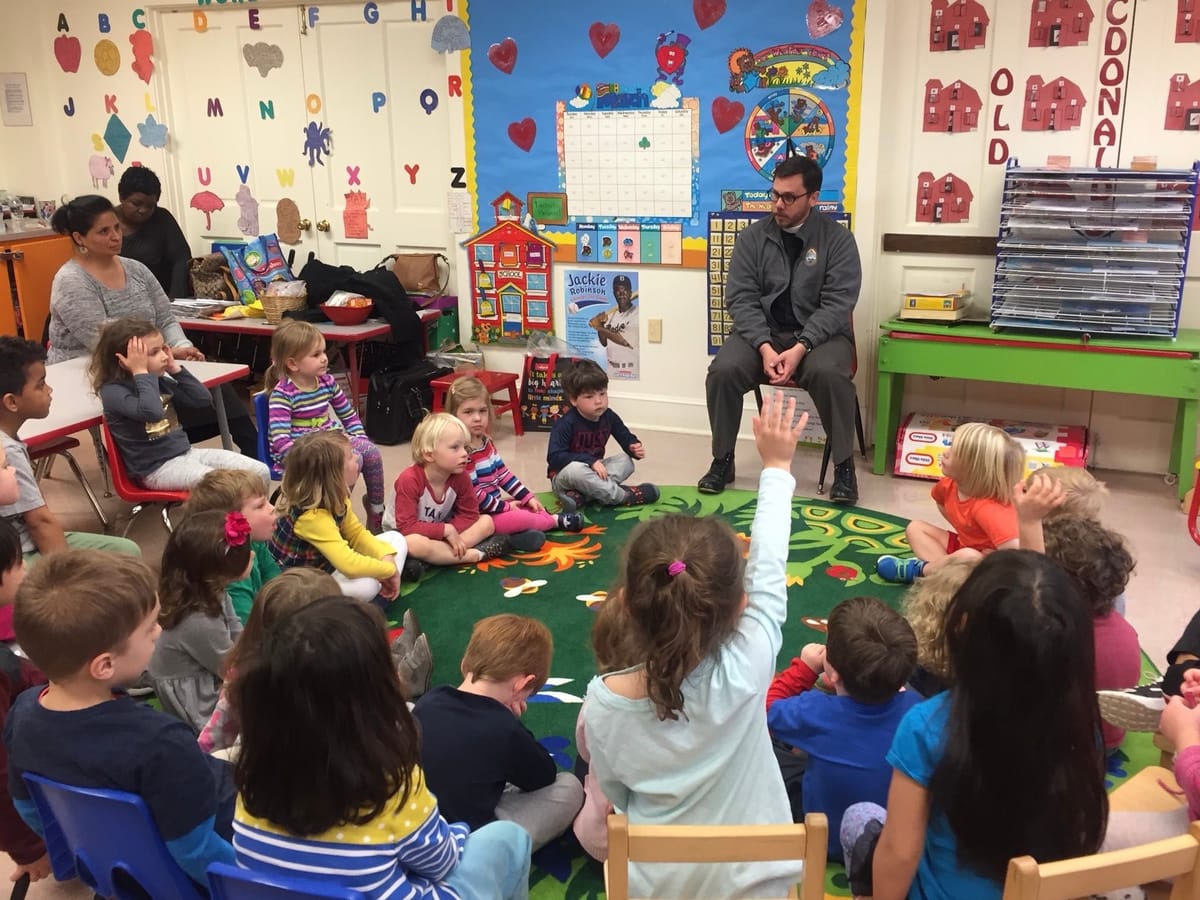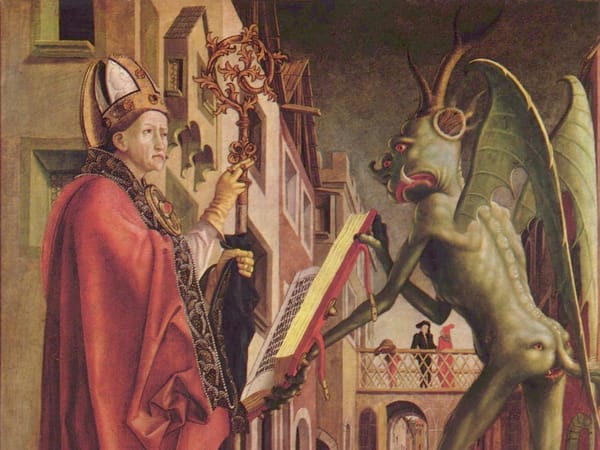The Uncommon Sense of our Uncommon Teacher
I can imagine Jesus using his teaching voice to explain this love... Our teacher knows that we, like little children, learn best through stories.

July 13, 2025 - The Fifth Sunday after Pentecost
My friends, I speak to you today in the name of one God, Father, Son, and Holy Spirit. Amen. Please be seated.
Good morning, Epiphany. It is good to be with you this morning. We’re jumping right into the sermon today. A few months back, a certain American political figure decided that he needed to weigh in on the concept of love, specifically the Christian understanding of love, because “liberals” were apparently all getting it wrong. His quote got worldwide attention, and I’m going to read it to you verbatim now, especially with the Gospel we just read fresh in your minds. “There’s this old school — and I think it’s a very Christian concept, by the way — that you love your family and then you love your neighbor and then you love your community and then you love your fellow citizens and your own country, and then after that you can focus and prioritize the rest of the world. A lot of the far left has completely inverted that. They seem to hate the citizens of their own country and care more about people outside their own borders.” He said it in the context of immigration policy, if you remember, and he followed this interview with a tweet, as public servants often do these days, that said this, “Just google ‘ordo amoris.’ Aside from that, the idea that there isn’t a hierarchy of obligations violates basic common sense.”
The public figure, of course, was Vice President J.D. Vance, a professing Catholic, and the Catholic church along with most of the Christian world took issue with his and our administration’s belief in “ordered love,” with their “basic common sense.” Pope Francis himself brought up today’s gospel reading, the parable of the Good Samaritan, in crafting his response, delivered soon after Vance’s remarks. “The true ordo amoris that must be promoted is that which we discover by meditating constantly on the parable of the Good Samaritan, that is, by meditating on the love that builds a fraternity open to all, without exception.” Pope Francis also wrote, “Love does not care if a brother or sister in need comes from one place or another, for love shatters the chains that keep us isolated and separate. In their place, love builds bridges. Love enables us to create one great family, where all of us can feel at home. Love exudes compassion and dignity... Jesus’ parable summons us to rediscover our vocation as... citizens of the entire world, builders of a new social bond... we are called to direct society to the pursuit of the common good.”
You know you’ve messed up when the Pope himself feels a need to address your theological mistakes. But what an opportunity, what a chance for the good news of the gospel to be preached in public! I have often said that if I have to find anything positive to say about the current political climate in America, well, it provides a lot of opportunity for all of us to share what Jesus Christ really was all about. The contrasts are just so stark.
Today’s parable is about as well-known as Jesus’s parables get; many of us could tell this story off the cuff to our children or in regular conversation. And this parable is relatively straightforward, considering how Jesus often is a little less direct. That’s not to say there aren’t many layers to the Parable of the Good Samaritan either. You’ve probably heard a handful of sermons on this one; I read a half dozen or so sermons this week to figure out where I wanted to land today, and each of them went in different directions.
We could talk about the priest and the Levite both neglecting the man on the side of the road; two men in positions of privilege concerned more with their schedules, their social status, seeing this beaten man as a distraction, irrelevant to their plans for the future, unworthy of their time. We could talk this morning about how all of us, like those two men (perhaps especially if we are at all religious), how we have failed to care for those in need, failed to do what needs to be done for the least of these. We fail to see the image of God in all our neighbors because our priorities, our comfort, our desires, they get in the way. ...That feels a bit judgmental, so we won’t go there. Grace does abound. Thank God.
We could talk about the lawyer, who isn’t a trial lawyer like Matlock or Perry Mason, but rather a scholar and an expert in the law. He seems to be looking for ways to bend the law, asking Jesus questions, “what must I do to inherit eternal life?” and “who is my neighbor though, really?” This scholar really knows his stuff though, as he answers Jesus correctly both times: “Love the Lord your God with all your heart, soul, mind, and strength,” and “love your neighbor as yourself” are indeed the paths to eternal life. And when Jesus tells a story about a foreigner showing the right standard of care for the beaten man, the lawyer recognizes the message and realizes that the beaten man’s neighbor, the good guy in this story, is the Samaritan, the one who showed him mercy, in fact caring for him far beyond what society might imagine is the bare minimum. Though we may seem to have some cultural baggage when it comes to lawyers, or to those who ask too many questions, this one really does seem to be on the right track.
But I’m not going to land with lawyers or priests or Levites today, nor am I going to simply repeat the very clear messages we have here in Jesus’s most famous parable, messages about caring for those in need regardless of nationality. You know those messages. They are simply too clear to miss. If you can’t read Christ’s calls for mercy as incredibly applicable and relevant in our world today, I fear that neither I nor even the Pope can help you.
Instead, I’d like to talk about teachers. You probably know a teacher or two. Our gospel story starts: “Just then a lawyer stood up to test Jesus. ‘Teacher,’ he said.” Didaskalos in the Greek, meaning a master instructor, or a specialist in teaching. The lawyer, a first-century expert in Jewish law, stands up and addresses the Son of God, this troublemaking prophet from Nazareth, and he calls him “teacher.” Most of you probably know that my wife Abbey taught second grade at Maple Grove Elementary last year, just up M-43. She’s teaching second grade again this fall. She has been a teacher since before we met; she earned her master’s in education from my alma mater, Olivet, and that’s how we met. Abbey, like the other teachers in her grade, is surrounded on a daily basis, nine months of the year, by tiny students, by little seven-, eight-, and nine-year-olds who both frustrate and delight her. They are dealing with the many things second graders deal with, but most clearly, like all of us, they are figuring out how to be human in a broken world.
I’m talking about teachers here today, not just because the lawyer called Jesus “teacher,” but also because teaching shows up in each of our lectionary texts. It’s most clearly there in the Psalm, which we had to read responsively today because our cantors are both out of town: “Show me your ways, O Lord, and teach me your paths. Lead me in your truth and teach me... Gracious and upright is the Lord, therefore he teaches sinners in his way. He guides the humble in doing right and teaches his way to the lowly.” In Deuteronomy, Moses is teaching the people of God’s goodness, urging them to follow God’s laws, laws that are already very near to them, in their mouths and hearts. And in his letter to the Colossians, Paul talks about learning from each other and prays that they “may be filled with the knowledge of God’s will in all spiritual wisdom and understanding.” Knowledge, spiritual wisdom, learning from following God closely, “teach me your truth and your paths, oh Lord” ...these all point to the vital, essential need for good teachers.
At our house, we were reminded this week that teachers are not just classroom lecturers, especially for second graders. As I have mentioned to some of you, and as you might have seen on Facebook, the father of one of Abbey’s students passed away in his home over the Fourth of July holiday. He was 39. Abbey attended his funeral last Wednesday. I was going to give you some of the details here this morning, but I would need far too many glasses of emotional support water to get through it... if you’d like to read them, you can pick up a copy of the sermon after service. (This student was one who always greeted me with a hug when I visited their class. She sat on Abbey’s lap when she was going through difficult times in the classroom. When Abbey showed up at her father’s funeral, the student ran to hug her. “I miss my dad,” she said... to her teacher.)
Even without all the details though, we all likely realize that our school teachers play an incredibly important role in our vulnerable young lives. They teach us how to read and solve math problems, yes, but they also provide emotional anchors for us as young humans, as students, they teach us how to be, in ways we can’t begin to understand. And teachers do the same for us when we’re grown too. Though we have more say in the matter, who we choose as our teachers absolutely and fundamentally shapes us. We don’t sit in elementary school classrooms anymore, but we do sit in front of news stations, in front of books, in front of internet articles or YouTube videos. We sit in front of our phones. We sit under the tutelage of the people we spend time with, the people we look up to.
What inputs do we allow to mold us? Which teachers have you chosen? Who is teaching you?
This morning, the teacher whom we profess to be the Son of God (kind of a big deal), he has a straightforward lesson for us, his students and followers. We love. We love God and we love our neighbor. Of course, we want to parse that out, we want to ask questions like the lawyer did, like any second grader would do: “Well, who exactly is this neighbor, Jesus? The person who lives in the home closest to mine?” I can imagine Jesus using his teaching voice, looking at his little students as he tells them a story. He probably wants to just make it clear with words, maybe with bulletin boards and posters and coloring sheets: “Love everyone. Love anyone in need especially. Love even your enemies. Love has no limits! Love knows no bounds! And follow me to see what love is. I’ll show you how much I love you... I’m even going to die for you. That is love.” But he doesn’t say it directly, not here at least. Our teacher, this Son of God, knows that we, like little children, we often learn best through stories. And so, we get the priest, the Levite, the Samaritan, and the beaten man.
This story’s lesson then, really any of the many lessons that you may take from this teacher’s story... they confound our basic common sense. This robbed and beaten-down man left by the side of the road was ignored by those who might care for him, those in his own tribe, those we’d expect to do what was right, or at least to give him a hand up. No, the beaten man had little to offer them. But the Samaritan, the foreigner, he showed him mercy, going above and beyond to care for someone from outside his tribe who was in clear and dire need. He bandaged the stranger’s wounds. He paid for his lodging and medical expenses. And our teacher tells us that this is what it means to love our neighbor.
Friends, as we all continue here at Epiphany to pursue lives marked by our abundant love for everyone around us, I ask first this morning that you consider who your teachers are. Are they leading you toward mercy, toward grace, toward relationship, toward love? I hope that they are. May we all follow and learn from those who will live and lead like Jesus. And may we all follow him as our teacher too, may we follow this very Son of God, who continually reminds his students that love has no limits, love knows no bounds.
Amen.




